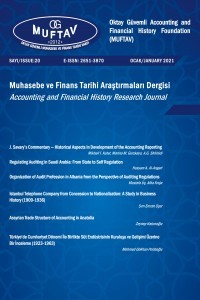Interactions Of Turkish Accounting Thought With Socio - Economic and Politic Devehopments and The Social Structure
Origins of the Turkish accounting thought could be traced to Central Asia, which was predicated on partially nomad and partially settled life. In time, Turks began to migrate from Central Asia to Anatolia, and eventually Central Asian accounting culture was replaced by the Anatolian accounting culture around 11th century. Anatolian accounting culture evolved within the framework of Persian and Arabic cultures. Another significant change in the accounting thought of the Turks occurred with the influence of Western European countries in the 19th century. These were sharp transitions that changed the accounting thought of a nation forever. This paper aims to find reasons for such transitions by examining socio-economic and political factors. Findings indicate that the Mediterranean and Silk Road trade routes, the relations with western countries had a westward effect in the development of Turkish accounting thought. Thus, the influence of statism and Islam limited the effects of these transitions for centuries
Keywords:
Accounting history, Turkish accounting culture, StateAccountancy,
- ISSN: 2146-4928
- Yayın Aralığı: Yılda 2 Sayı
- Başlangıç: 2011
- Yayıncı: Oktay Güvemli Muhasebe ve Finans Tarihi Vakfı (MUFTAV)
Sayıdaki Diğer Makaleler
Anadolu Muhasebe Kayıt Kültürünün Doğuşu - 1350-1500 -
Fatih Coşkun ERTAŞ, Halil İbrahim ALPASLAN, Yücel AKDEMİR
Türkiye'de F Klavyeyi, Türk Stenosunu Hazırlayan İhsan Sıtkı Yener (1925-2016)
Uşak Şeker Fabrikasının Kuruluşu ve Gelişmesi
Oktay GÜVEMLİ, Mehmet KARAYAMAN
Prof. Dr. Oktay Güvemli Türkiye'de Lisans Düzeyinde İşletme Eğitimi Tarihi Konusunda Konferans Verdi
O.G. Muhasebe ve Finans Tarihi Vakfı (MUFTAV) Kütüphanesi Tanıtım
Emel ÇAPKINER TOSUN, Güzide ATAİ
Osmanlı'dan Cumhuriyet'e Bir Muhasebe Düşünürü: İsmail Hamid (1861-1931)
